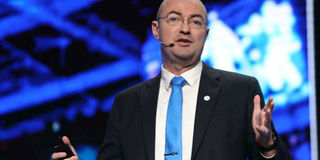Forum draws attention to threat of nuclear terrorism

Yigal Unna, Director General of the Israel National Cyber Directorate during the Cybertech Global Conference in Tel Aviv. PHOTO | FAUSTINE NGILA | NATION MEDIA GROUP
What you need to know:
- Speaking on behalf of Prime Minister Benjamin Netanyahu during the forum, Israel’s Minister of Energy Yuval Steinitz stressed the need for governments to use artificial intelligence (AI) to proactively prevent nuclear terrorism.
- Yiftah Ron-Tal, chairperson of the Israel Electric Corporation board, said the future of the energy sector lies within decentralised smart power networks for better cybersecurity.
- While no cyberdefence mechanism can guarantee 100 per cent safety on the internet, Israel tops the world with 95 percent of live cybersecurity, according to Gartner.
IN TEL AVIV, ISRAEL
The seventh annual Cybertech Global Conference has drawn critical attention to the shock waves of cyberthreats on energy, as attackers devise more advanced tools to control social life even as hyperconnectivity in a rapidly changing technology space becomes inevitable.
Speaking on behalf of Prime Minister Benjamin Netanyahu during the forum, Israel’s Minister of Energy Yuval Steinitz stressed the need for governments to use artificial intelligence (AI) to proactively prevent nuclear terrorism.
The near future of cyberdefence must use AI because the field is already very complicated,” he said, adding that more emphasis is needed in protecting nuclear power stations all over the world.
“This is because the calamities that can be caused by attacks on nuclear reactors are beyond imagination. Countries like Iraq can create a lot of havoc to other crucial systems like communication and transportation,” he highlighted.
Accentuating the sensitivity of the energy sector in Israel and the world, he expounded that if cybercriminals manage to paralyse the systems in the energy sector such as solar power stations, electricity transmission and water supply chains, it could be a total disaster.
Having detected a very sophisticated potential attack on power stations that aimed at controlling and vandalising Israel’s energy systems a few months ago, the energy ministry embarked on building an energy cyber-laboratory in Beer Sheva, the cyber-capital in the southern region of the “Start-up Nation”.
POWER NETWORKS
Yiftah Ron-Tal, chairperson of the Israel Electric Corporation board, said the future of the energy sector lies within decentralised smart power networks for better cybersecurity.
Predicting that 80 per cent of power consumption and retailing will be on a blockchain by 2040, he underscored that any surface exposed to the sun will be able to generate energy.
“Through a decentralised system, every family will generate power for its needs and sell the surplus in digital tokens to the electric corporation. They will be power consumers, producers and retailers. Every home will own the grid system,” he remarked.
Maj-Gen Ron-Tal also painted the picture of a future of energy where a multidimensional and sectoral power system will connect all devices, and termed it the Internet of Electricity (IoE).
“Through an international peer-to-peer blockchain platform, every power consumer will be connected and payments will be made as tokens of the Wattcoin cryptocurrency to give affordable power to one billion humans who live without power in all five continents,” he exemplified.
BLOCKCHAIN
Blockchain technology has garnered global popularity due its immutability, decentralised, enhanced security, traceable and data protection features.
However, he warned world governments that technology alone is not enough, since the modern cyber-environment comes with existential threats, where 11,000 attacks per second are launched against power systems.
“The attack surface is endless. The border between Information Technology (IT) and Operational Technology (OT) is not clear anymore. Older systems are no longer unique. The world needs real-time collaboration in threat intelligence,” he told delegates of the second largest cyber-forum outside the United States.
The director-general of the Israeli National Cyber Directorate, Mr Yigal Unna, revealed that cyber-insecurity is sixth on the index of the most potential risks to human life.
“The ecosystem has never been as complex and dangerous, but we have national initiatives to guarantee cybersecurity such as the hotline number 119 which citizens can call whenever they feel insecure. We respond immediately and keep monitoring cyber-risk scores of attacks all over the world,” he said.
ISRAELI INDUSTRY
While no cyberdefence mechanism can guarantee 100 per cent safety on the internet, Israel tops the world with 95 per cent of live cybersecurity, according to Gartner.
More than 540 Israeli IT companies specialise in cybersecurity, contributing to 46 per cent of GDP in exports, according to Bloomberg.
The industry was born in the late 80s and has grown to be the world’s destination for security on the web, cloud, IoT, air, land and sea.
The forum, founded seven years ago by veteran military correspondent Amir Rapaport, who doubles as the editor-in-chief of Cybertech and Israel Defense, attracts over 2.5 million visitors ever year from around the world. Mr Rapaport was a journalist for Israeli publications Maariv and Yediot Achronot.





